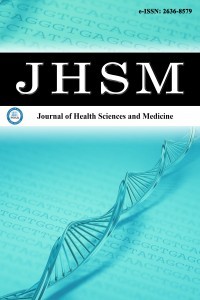Factors affecting Grade Point Average among nursing students at college of applied medical science.
Factors, Grade Point Average, Nursing Students
Factors affecting Grade Point Average among nursing students at college of applied medical science.
Factors, Grade Point Average, Nursing Students,
___
- Marquez VC, Romero C, Ventura S. Predicting School Failure Using Data Mining. In Proceedings of the 4th International Conference on Educational Data Mining. 2011; 6: 271-6.
- Bratti M, Staffolani S. Student time allocation and educational production functions, Conference paper at the XIV annual EALE conference. 2002.
- Schlee BM, Mullis AK, Shriner M. Parents Social and Resource Capital: Predictors of academic achievement during early childhood. Children and youth services review. J Educ Psychol 2008; 96: 778-84.
- Alos SB, Caranto LC, David JJT. Factors Affecting the Academic Performance of the Student Nurses of BSU. Int J Nurs Sci 2015; 5: 60-5
- Stomberg M, Nilsson K. Nursing students’self-graded motivation to complete their programme of study. Open Nurs J 2010; 4: 42-7.
- Soares AP, Guisande MA, Almeida LS, Paramo M.F. Academic Achievement in first-year Portuguese college students: The role of academic preparation and learning strategies. Int J Psychol 2009; 44: 204-12.
- Zhonglu L, Zeqi Q. How does family background affect children’s Educational achievement? Evidence from Contemporary China. Chin J Sociol 2018; 5: 13
- Hayden K, Ouyang Y, Scinski L, Olszewski B, Bielefeldt T. Increasing student interest and attitudes in STEM: Professional development and activities to engage and inspire learners. CITE 2011; 11: 47-69.
- Goddard RD. Relational networks, social trust, and norms: A social capital perspective on students’chances of academic success. Educ Eval Policy Anal 2003; 25: 59-74.
- Krashen S. The hard work hypothesis: Is doing your homework enough to overcome the effects of poverty? Multicult Educ 2005; 1: 16-9.
- Fantuzzo J, Tighe E. A family involvement questionnaire. J Educ Psychol 2000; 92: 367-376.
- Barnard WM. Parent involvement in elementary school and educational attainment. Child Youth Serv Rev 2004; 26: 39- 62.
- Jensen B, Seltzer A. Neighbourhood and family effects in educational progress. Aust Econ Rev 2000; 33: 17-31.
- Alos SB, Caranto LC, David JJT. Factors affecting the academic performance of the student nurses of BSU. Int J Nurs Sci 2015; 5: 60-5.
- Elvis MG. Factors influencing academic achievement in quantitative courses among business students of private higher education institutions.J Educ Pract 2013; 4: 57-60.
- Richardson JTE. Investigating the relationship between variations in students‘ perceptions of their academic environment and variations in study behaviour in distance education. Br J Educ Psychol 2006; 76: 867–893
- Manizheh A. Causes of poor academic performance among omani students. Int J Soc Sci Res 2016; 4: 8-11.
- Miguel AC, Ksenia P. Influence of study habits on academic performance of International college students in Shanhai. CCSE 2015; 5: 42-55
- Meenu D. Factors affecting the academic achievement: A study of elementary school students of NCR Delhi, India. J Educ Pract 2016; 7: 70-4
- Bonci A. A research review: The importance of families and the home environment, National Literacy Trust. 2008; Retrieved from https://files.eric.ed.gov/fulltext/ED521654.pdf
- Joseph S, Owoeye Y. School facilities and academic achievement of secondary school agricultural science in Ekiti state, Nigeria. Asya Soc Sci 2011; 7: 64-74.
- Yayın Aralığı: Yılda 6 Sayı
- Başlangıç: 2018
- Yayıncı: MediHealth Academy Yayıncılık
Evaluatıon of the timing and indications of antenatal corticosteroid administration
Özlem Banu TULMAÇ, Merve ÖZTÜRK, Selen YAMAN, Ali ÇAĞLAR, Dilek SAHİN
Pelvik inflamatuar hastalık ve kontrasepsiyon : Üçüncü basamak merkezde kesitsel bir çalişma
Mehmet ZENGIN, Merve ERYOL, Merva AYDEMİR AKKAYA, Mahi BALCI, Selim YALÇIN, Devrim TUĞLU
Yusuf KARATAŞ, Zakir KHAN, Ezgi Sena GÖREN ÖZAGİL, Ayşe Büşra ABUSSUUTOĞLU, Aykut PELİT, Elif KOÇAK
Nadir bir tibia'da adamantinoma olgusu, radyolojik özellikleri
Halil İbrahim ŞARA, Fatih ATEŞ, Mehmet Sedat DURMAZ
Skin rashes in COVID-19: A report of three cases
Yusuf KARATAŞ, Zakir KHAN, Ezgi Sena GÖREN ÖZAGİL, Ayşe Büşra ABUSSUUTOĞLU, Aykut PELİT, Elif KOÇAK
The effect of erector spinae plane block on cost of percutaneous nephrolithotomy surgery
Factors affecting Grade Point Average among nursing students at college of applied medical science.
